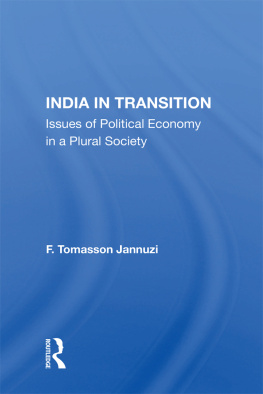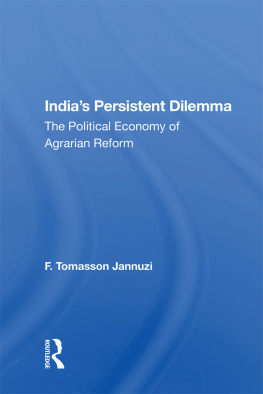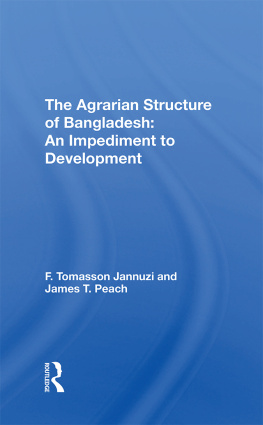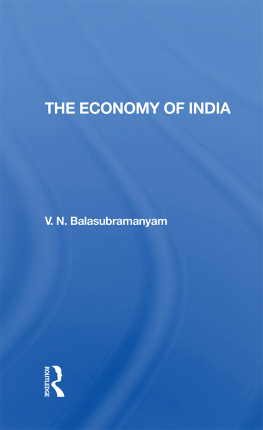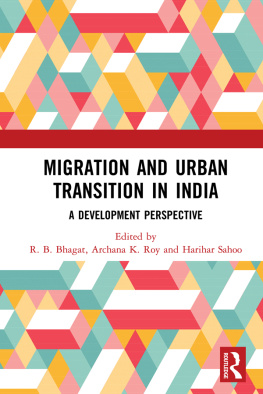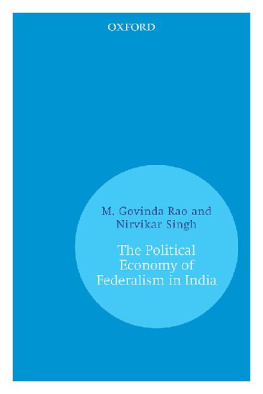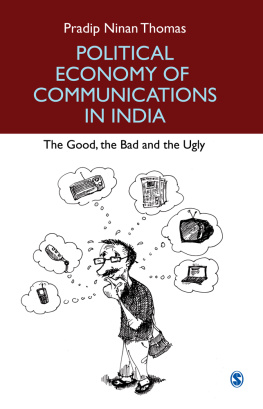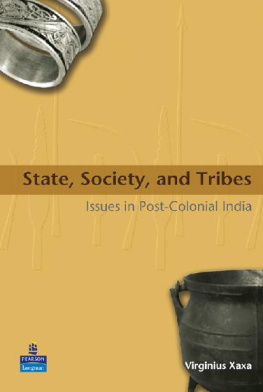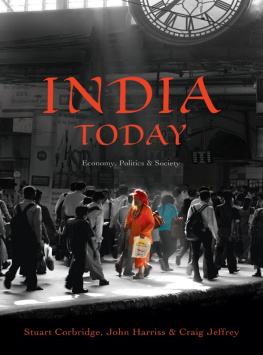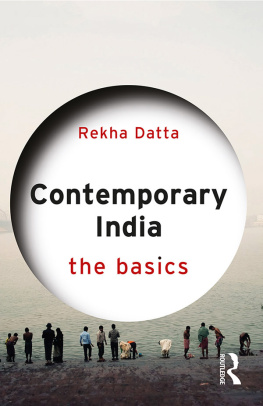First published 1989 by Westview Press, Inc.
Published 2018 by Routledge
52 Vanderbilt Avenue, New York, NY 10017
2 Park Square, Milton Park, Abingdon, Oxon OX14 4RN
Routledge is an imprint of the Taylor & Francis Group, an informa business
Copyright 1989 Taylor & Francis
All rights reserved. No part of this book may be reprinted or reproduced or utilised in any form or by any electronic, mechanical, or other means, now known or hereafter invented, including photocopying and recording, or in any information storage or retrieval system, without permission in writing from the publishers.
Notice:
Product or corporate names may be trademarks or registered trademarks, and are used only for identification and explanation without intent to infringe.
Library of Congress Cataloging-in-Publication Data
Jannuzi, F. Tomasson. 1934
India in transition: issues of political economy in a plural
society / by F. Tomasson Jannuzi.
p. cm.(Westview special studies on South and Southeast
Asia)
Includes index.
ISBN 0-8133-7723-4
1. IndiaEconomic policy1980- . 2. IndiaEconomic
conditions1947- . I. Title. II. Series.
HC435.2.J358 1989
320.954dc19 88-39689
CIP
ISBN 13: 978-0-367-01343-1 (hbk)
I believe that it should be standard in the social sciences for an author to identify the personal valuations and assumptions that condition or qualify his work. By this means he can give his readers a sense of his motivation and biases, providing them a basis for interpreting the context that informs the work. What follows is my attempt to enable readers to trace the origins of my approach and arguments.
The essay derives in part from my peculiar experience in the field of "Indian Studies" over more than thirty years--roughly from 1954 to the present, 1988. From my undergraduate days at Dartmouth College in the 1950s, I have been intrigued with the problems and prospects of The Republic of India. The precise origins of my interest in India are obscure. But, it is significant to me that my interest was already so deeply defined in 1954 (when I was nineteen years of age) that I sought and secured a fellowship at Dartmouth that would permit me to spend my senior year in independent study and research on India.
That fellowship gave me a competitive edge in securing in 1955 one of a limited number of Foreign Area Fellowships sponsored by the Ford Foundation. My fellowship, consistent with my own design, supported me for several years of study in Britain (at the London School of Economics and the School of Oriental and African Studies) and field research in India. Given my interest in India, my primary alternative to graduate study in Britain at that time would have been to matriculate at the University of Pennsylvania, where W. Norman Brown had initiated in 1946 what was then widely perceived to be the only significant American program in South Asian studies. At the time, I recall rejecting even the notion of applying for admission at Pennsylvania because my incipient interests in India were already focused on contemporary issues of development and political economy, rather than on what I presumed to be the classical civilization emphasis at Pennsylvania. Even then the challenge of India for me had to do mainly with its developmental aspirations and dreams for the future, and not with the history of its great civilizations.
In London I was drawn progressively away from the intellectual emphases at the School of Oriental and African Studies to those of the London School of Economics and Political Science. That is to say, in an elemental sense, I became more preoccupied with die hopes and aspirations of those who were concerned with modern India than with the focus of those who concentrated on the British Raj and the richness of India's historical traditions; indeed, "the wonder that was India."
The prime stimulus in this was the inspired teaching and scholarship of the late Vera Anstey of the London School of Economics. No one could work closely with Vera Anstey without being profoundly influenced. It was she together with some already venerated "old India hands" with whom she maintained close ties, Sir Malcolm Darling and Harold Mann--who first encouraged me to design a program of field research in India that would be rooted in the countryside, rather than in academic or governmental institutions.
For Anstey, Darling, and Mann, the future of India would be determined by poor peasants, rather than by a few leaders drawn from the urban, educated, English-speaking elite who were then a conspicuous part of the British colonial legacy. For them, unlike those whose definition of economic progress was largely urban and it was obvious that the economic development of India would have to be based on an agricultural revolution that conferred hope, increased opportunity, and new dignity to India's rural majority. For them, India's future was dependent less on whether British-inspired parliamentary institutions took hold and were ritualistically perpetuated than on the ability of the newly independent state to deliver the mass of the people out of poverty.
While never preaching the point, Anstey, Darling and Mann demonstrated in their behavior and orientation a belief that India's independence and political freedom would be without much substance if its rural majority did not experience personally the benefits of economic emancipation. I came to share their view.
Therefore, it is not surprising that, when I finally encountered India first-hand in 1956, I eschewed living in an urban area, did not rely on data on rural India generated by the Planning Commission in New Delhi, and attempted both to establish my own nexus with the people in the countryside and to gather, however imperfectly, my own data. In this enterprise, aided by a friend, Dayanand Sahay, who had been associated with Jaya Prakash Narayan, I had my initiation to India in rural Bihar.
Why Bihar? I was intrigued then as I am now with the fact that Bihar is synonymous with economic and political backwardness in modern India, yet was both the home of advanced civilizations in ancient India and peculiarly blessed in its modern economic potential (with rich soil, a high water table, and an unusual spectrum of natural resources). If this state, with a potential for economic progress greater than that of the Punjab, could not be transformed economically, which state could?
My immersion in Bihar, my exposure to what can be described as a traditional agrarian economy and its local critics (especially friends in the Praja Socialist Party, and Jaya Prakash Narayan), had a decisive influence in shaping my perceptions of some of the problems of modern India. My first-hand encounters with landlords, or zamindars, who exercised semi-feudal control over the people in the countryside, my experience within a largely pre-market or command economy, my sense of the powerlessness of people without land in an agrarian society--all these things were products of my time in Bihar. None of the reading on India I had done had equipped me adequately for that experience. I was shocked and angered by what I saw in Bihar in 1956-1957--by the elemental violence meted out customarily to poor peasants within the framework and hierarchical traditions of the zamindari system, and by the then seeming acquiescence of the people to the power and prerogatives of those above them in the agrarian hierarchy. I was also greatly moved by the dignity and wisdom of the rural poor, and their willingness to reach out to me in ways that conferred some acceptance, despite puzzlement at my presence and purposes.


